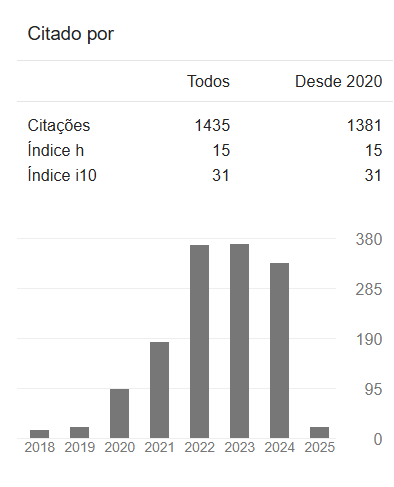THE FORMATION OF THE TEACHER FOR THE PRODUCTION OF THE IDENTITY DISCOURSE OF THE YOUNG BLACK IN WRITING CLASSES
DOI:
10.23926/RPD.2022.v7.nEspecial.e22103.id1744Keywords:
Teaching, Reading, Production of audiovisual textAbstract
It is a fact that with the evolution of pedagogical practices, other ways of teaching and learning are emerging, as the use of technological tools such as minute-video. The theme of the video-minute remained focused on the issue of the identity of Afro-descendants who do not expose what they think about the situation of black people in Brazil. Thus, the research aimed to verify and describe the use of the digital video-minute genre as a means to enable Afro-descendant students against the racism they face at school and in their daily lives. The methodology adopted was action research, with a qualitative nature, resorting to referential and fictional reading in the classroom. The theorists who guided the approach that supported this dissertation were Bakhtin (2000), Bronckart (2007), Marcuschi (2008), Almeida (2019), Quijano (2005) and Schwarcz (1993); in addition to the BNCC (2018). With the development of this dissertation, it is expected to foster more discussions about black people in Brazil, stimulate students' opinion about their own context.
Downloads
Metrics
References
ALTHUSSER, Louis. Aparelhos ideológicos de Estado e a escola. Petropólis: Vozes, 1999.
ALMEIDA, Silvio Luiz de. Racismo estrutural. São Paulo: Pólen, 2019.
BAKHTIN, Mikhail. Estética da criação verbal. Trad. Maria Ermantina Galvão; rev. Trad. Marina Appenzeller. 3.ed. São Paulo: Martins Fontes, 2000.
BRAIT, Beth; SOUZA-e-SILVA, Maria Cecília (orgs.). Texto ou discurso? São Paulo: Contexto, 2012.
BRASIL. Lei 10.639 de 9 de janeiro de 2003. Altera a Lei no 9.394, de 20 de dezembro de 1996, que estabelece as diretrizes e bases da educação nacional. Disponível em: http://etnicoracial.mec.gov.br/images/pdf/lei_10639_09012003.pdf. Acesso em 01 mar. 2020.
BRASIL. Ministério da Educação. Base Nacional Comum Curricular. Brasília, 2018.
BRONCKART, Jean-Paul. Atividade de linguagem, discurso e desenvolvimento humano. Campinas, SP: Mercado de Letras, 2006.
BRONCKART, Jean-Paul. A atividade de linguagem em relação à língua – Homenagem a Ferdinand de Saussure. In: GUIMARÃES, Ana Maria de Mattos; MACHADO, Anna Rachel; COUTINHO, Antónia (Org.). O interacionismo sociodiscursivo. Campinas: Mercado de Letras, p. 19-42, 2007.
BRONCKART, Jean-Paul. O agir nos discursos: das concepções teóricas às concepções dos trabalhadores. Trad. de Anna Rachel Machado e Maria de Lourdes Meirelles Matêncio. Campinas, SP: Mercado de Letras, 2008.
CIRINO, Nathan Nascimento. Cinema interativo: problematizações de linguagem e roteirização. Recife, 2012. 144 f. Dissertação (mestrado) - UFPE, Centro de Artes e Comunicação, Programa de Pós-graduação em Comunicação, 2012. Disponível em: https://repositorio.ufpe.br/handle/123456789/11022. Acesso em 14 out. 2022.
FANON, Frantz. Pele negra, máscaras brancas. Salvador: Ed. UFBA, 2008.
FERNANDES, Florestan. A Integração do Negro na Sociedade de Classes. Volume I. Ensaio de Interpretação Sociológica. 5. ed. São Paulo: Globo, 2008.
FIORIN, José Luiz. Interdiscursividade e intertextualidade. In: BRAIT, Beth (Org.). Bakhtin: outros conceitos chave. 1. ed. São Paulo: Contexto, 2006, p. 161-193.
FOUCAULT, Michel. Vigiar e Punir: nascimento da prisão. Trad. Lígia Maria Pondé Vassalo. Petrópolis: Vozes, 1987.
GILROY, Paul. O Atlântico Negro: modernidade e dupla consciência. 2.ed. São Paulo: Ed. 34, 2012.
GUIMARÃES, Antônio Sérgio Alfredo. Racismo e anti-racismo no Brasil. São Paulo, Editora 34, 1999.
HALL, Stuart. A identidade cultural na pós-modernidade. 10. ed. Rio de Janeiro: DP&A, 2005.
HOUAISS, Antônio. Dicionário Houaiss da Língua Portuguesa. Rio de Janeiro, Ed. Objetiva, 2000.
MARCUSCHI, Luiz Antônio. Produção textual, análise de gêneros e compreensão. São Paulo: Parábola Editorial, 2008.
MUNANGA, Kabengele (org.). Superando o racismo na escola. Brasília: Ministério da Educação, Secretária de Educação Continuada, Alfabetização e Diversidade, 2005.
MUNANGA, Kabengele. Uma abordagem conceitual das noções de raça, racismo, identidade e etnia. In: BRANDÃO, André Augusto Pereira (org.). Cadernos Penesb 5. Niterói: EdUFF, 2004.
QUIJANO, Aníbal. Colonialidade do poder, eurocentrismo e América Latina. In: LANDER, Edgardo. (org). A colonialidade do saber: eurocentrismo e ciências sociais. Perspectivas latino americanas. Buenos Aires, Colección Sur Sur, 2005, p.107-130.
PEREIRA, João Baptista Borges. A criança negra: identidade étnica e socialização. São Paulo: cadernos de pesquisa (USP) nº 63, novembro de 1987. p. 41-45. Disponível em: http://www.fcc.org.br/pesquisa/publicacoes/cp/arquivos/654.pdf. Acesso em 14 out. 2022.
RAMOS, Alberto Guerreiro. A Introdução Crítica à Sociologia Brasileira. Rio de Janeiro. Andes, 1957. DOI: https://doi.org/10.2307/3538119
RIBEIRO, Darcy. O povo brasileiro: a formação e o sentido de Brasil. 3. ed. São Paulo: Global, 2015.
SANTOS, Joel Rufino dos. O movimento negro e a crise brasileira. Política e Administração, v. 2, jul./set., 1985.
SCHWARCZ, Lilia Moritz. O Espetáculo das Raças: cientistas, instituições e questão racial no Brasil 1870-1930. São Paulo: Companhia das Letras, 1993.
SILVA, Tomaz Tadeu da (org.). Alienígenas na sala de aula. Petrópolis, RJ: Vozes, 1995.
THIOLLENT, Michel. Metodologia da pesquisa-ação. 18. ed. São Paulo: Cortez, 2011.
Downloads
Published
How to Cite
Issue
Section
License
Copyright (c) 2023 A Revista Prática Docente tem o direito de primeira publicação

This work is licensed under a Creative Commons Attribution-NonCommercial 4.0 International License.
Authors who publish in this journal agree to the following terms:
- Authors retain the copyright and grant the journal the right of first publication, with the paper simultaneously licensed under the Licença Creative Commons Attribution allows the sharing of the work with acknowledgment of authorship and initial publication in this journal.
- Authors are authorized to take additional contracts separately, for non-exclusive distribution of the version of the work published in this journal (e.g. publish in institutional repository or as a book chapter), with acknowledgment of authorship and initial publication in this journal.











